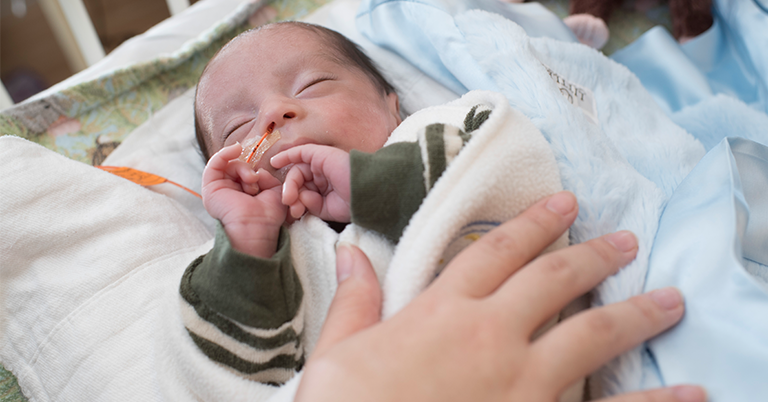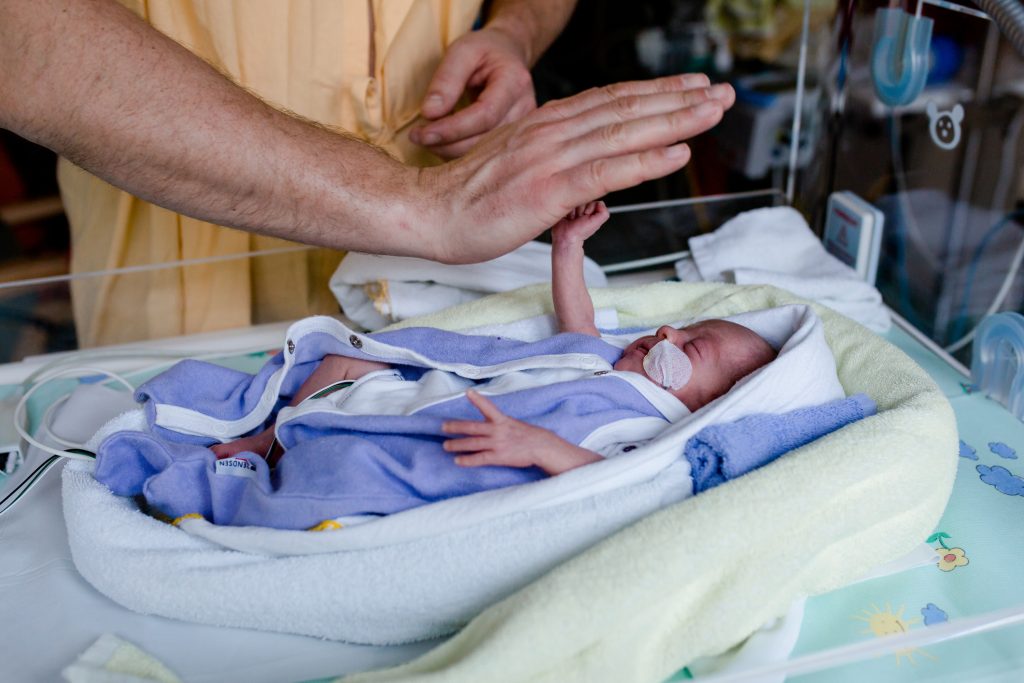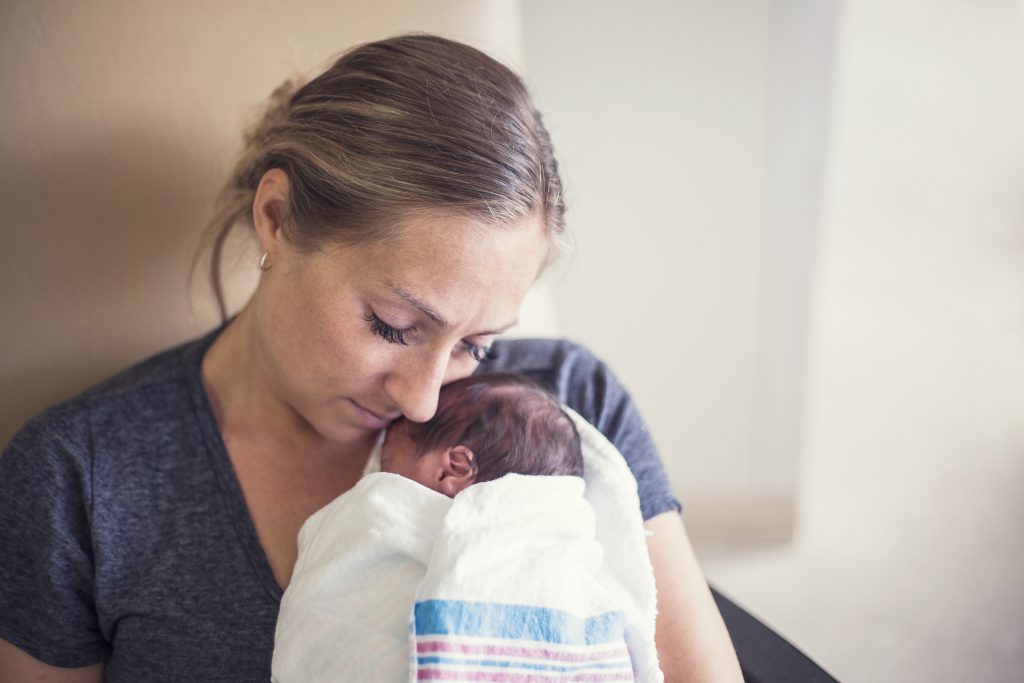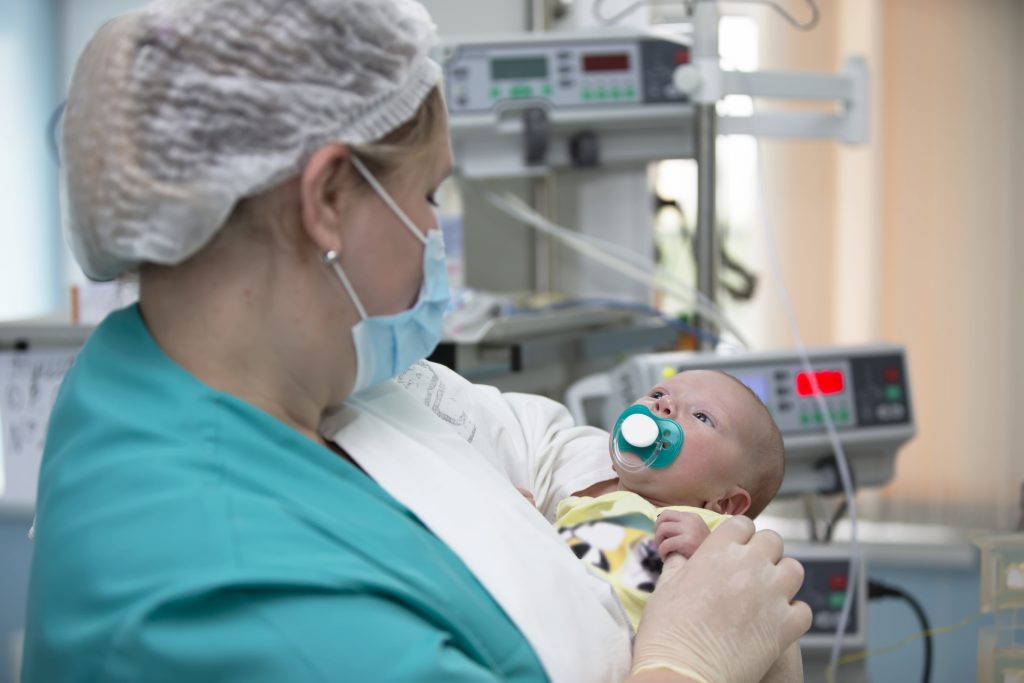
Having a baby in the neonatal intensive care unit (NICU) can be very scary for parents. The Mother Baby Center knows that you might feel scared or worried if you have a sick or premature baby. We’re here to help and support you. We have the answers to your most pressing questions and can help provide peace of mind if you have a NICU baby.
What is the NICU?
NICU stands for neonatal intensive care unit. When babies are born early, have health problems or have a difficult birth, they go to the NICU where they can get around-the-clock care from our neonatal team made up of 500 doctors, pediatric surgeons, neonatal nurse practitioners and specially trained health care providers.
You may also hear a NICU referred to as the following:
- Special care nursery
- Intensive care nursery
- Well newborn nursery
Why do babies go to NICU?
Babies may be admitted to the neonatal intensive care unit (NICU) for a variety of reasons. These could include preterm delivery, infections, heart defects, abnormalities with breathing or digestion, and congenital disorders. Regardless of the underlying cause, the NICU is specifically designed to provide advanced medical care and support to newborns in need.
See our inspiring birth stories from the NICU and Midwest Fetal Care Center.
Most babies go to neonatal intensive care units within 24 hours of birth. Some sick and premature babies will be in the NICU for a few hours or days, while newborn babies may need neonatal care for weeks or months. It all depends on their unique health needs.

What are the different levels of neonatal care?
Neonatal care is divided into four distinct levels, each of which focuses on providing comprehensive and specialized support to newborns.
Level I: Basic neonatal care
Provides care for healthy newborns or those with mild illnesses.
Level II: Special Care Nursery
Provides care for moderately ill newborns, including those with respiratory problems, infections, or feeding difficulties.
Level III: Neonatal intensive care unit (NICU)
Provides advanced care for critically ill newborns, including premature babies, those with life-threatening illnesses, and those who require surgery.
Level IV: Regional NICU
Provides the highest level of care for the most critically ill newborns, including those who require ECMO (extracorporeal membrane oxygenation), major surgery, or other advanced interventions.
Children’s Minnesota offers Level IV neonatal care, the highest level recognized by The American Academy of Pediatrics, at its Minneapolis campus. In partnership with the Midwest Fetal Care Center, Children’s Minnesota provides comprehensive in-house care for the most complicated health conditions and critically ill newborns.
How can I help care for my NICU baby?
Many parents in the NICU want to be involved with their baby’s care as much as they can. You can become involved in the care of your newborn while they’re in a neonatal intensive care unit (NICU) by doing these things:
Participating in the feeding process.
One of the most important ways to bond with your premature infant in the NICU is to participate in feedings. This could include helping with breastfeeding, bottle-feeding, or handling the infant during tube feedings.
Learning the baby’s NICU schedule.
Learning the baby’s feeding and sleeping schedule can help you feel more involved and equipped to help with the care process.
Read advice for first-time parents from a neonatal nurse.
Providing comfort through physical touch.
Touching and holding your baby, if possible, can provide comfort and support to both you and your newborn.
Communicating with health care staff.
Staying in contact with doctors and nurses, and asking questions about the baby’s care, can help you feel more involved and informed about your baby’s progress.
Overall, participating in your newborn’s care as much as possible will create a strong bond with your baby and help support their growth and healthy development.

Will I be able to breastfeed or bottle-feed my baby in the NICU?
Whether you prefer breastfeeding or bottle-feeding, you can still play an active role in feeding your baby in the NICU. The health care staff is there to guide you every step of the way, even if your little one needs to receive feedings through a tube or IV. If your baby can breastfeed or bottle-feed, the staff can help you perfect your technique and ensure your baby is getting the nutrition they need. Remember, don’t be afraid to ask questions and seek support from the experts.
For some babies in the NICU, feeding can be a challenge and they may need a little extra support to get all the nutrients they need. If your baby requires a feeding tube in the neonatal intensive care unit, you can still participate in the feeding process. You can provide breast milk or formula to the neonatal care team to give to your baby through the feeding tube or the neonatal nurses can guide you on how to handle and care for the feeding tube to help feed your baby. In these cases, it’s important to talk to your neonatal care team about your desire to be involved in your baby’s care and ask them how you can participate in the feeding process.
See nine best breastfeeding positions for you and baby.
How can I get to know my NICU baby’s feeding schedule and sleeping routine?
Your baby’s NICU team members can tell you when your baby should eat and sleep. The more time you spend with your baby in the neonatal intensive care unit, the more you will learn about:
- What type of interaction your baby likes — stroking, hand holding or singing.
- What time of day your baby is the most alert.
- How long your baby can respond to you before getting tired.
- When your baby is stressed and needs to rest.
When you’re caring for your newborn, talk in a calm, soothing voice, keep lights dim and keep noise to a minimum. It’s important to spend time with your baby, but let them sleep when they need it.
How can I become familiar with the equipment used in the NICU?
When you first enter a NICU, you might feel a little alarmed by all of the equipment—but that’s normal! All of that equipment is there to help your baby get well. Here’s a brief list at some equipment you might find:
- Infant warmers
- Incubators
- Phototherapy
- Monitors:
- Chest leads
- A pulse oximetry (or pulse ox)
- A temperature probe
- Blood pressure
- Feeding tubes
- IVs
- Lines
- Ventilators
- Oxygen hood or nasal cannula

You can always ask your nurse or doctor to help explain the equipment to feel more comfortable with it all. Here are a few ways to get more familiar with the special equipment used to care for your baby:
- Ask the health care staff to explain the purpose and function of each piece of equipment.
- Observe how the health care staff use the equipment to care for your baby.
- Ask the health care staff to show you how to use any equipment you will need to use at home.
- Take notes or ask for handouts or brochures that explain the equipment and its use.
Can I hold my baby in the NICU?
Depending on your baby’s health, you may be able to hold your little one, even if they are on a ventilator or have an IV. If the doctors feel that would be too much, you can still hold your baby’s hand, stroke his or her head, and talk and sing to him or her.
If you can, skin-to-skin contact, or “kangaroo care,” is a good way to bond with your baby:
- Place your baby (who’s usually dressed in just a diaper and a hat) on your chest underneath your shirt, so your little one is resting on your skin.
- Loosely close your shirt over your baby to help keep him or her warm.
Skin-to-skin contact can help with breastfeeding and improve healing times so that babies go home sooner. However, for some very premature infants, touching is stressful. Your baby’s care team may suggest that you limit physical touch, but you can still spend time with your baby. NICU staff can help you figure out how much and what type of touch is best.

How can I cope with the stress of having a newborn in the NICU?
We understand that having a baby in the NICU can be one of the most stressful times in your life. You may be away from your circle of support or other children. You may feel like your life has been turned upside down as you wait for the day when your baby is ready to go home with you.
While it is hard, it’s important to try to keep things as normal as possible. These tips can help:
- Pay attention to your own needs and those of the rest of your family, especially other kids. Doing something for yourself can be as simple as taking a relaxing bath, going for a walk or reading a book.
- Make plans for a weekly family activity, and sit down together and talk about how this experience makes you feel.
- Turn to other parents whose babies are in the NICU for support. They’ll know better than anyone what you’re feeling. Join an in-person or virtual support group to share your feelings, worries, and triumphs together.
- The hospital’s chaplain also can give you support.
When you take care of yourself, you’ll be more rested and better able to take care of and get to know your baby. While a NICU stay can be hard, it’s also rewarding to watch your little one grow stronger each day.
Going through the NICU experience with a newborn can be incredibly daunting and nerve-wracking for parents. However, with a little help, it doesn’t have to be as overwhelming. Parents can take an active role in their baby’s care by getting involved in daily routines, like feeding and holding their little one. Your baby’s health care team is there to provide guidance and answer any questions. As a parent, it’s important to remember your baby is in good hands and receiving top-quality care in the NICU.

The Mother Baby Center neonatal program and NICU through Children’s Minnesota
The Mother Baby Center is a partnership between Children’s Minnesota and Allina Health. After delivery, some babies go home within a couple of days while others may need to stay with us for a longer period of time. When it happens that your baby may need to stay, the experts at Children’s Minnesota are there for you.
The Children’s Minnesota neonatal team of nearly 500 doctors, surgeons and pediatric specialists is the largest in Minnesota—and one of the largest in the country. With nearly 200 neonatal beds in their hospitals and special care nurseries, they welcome nearly 3,000 newborns every year. Also, in collaboration with the Midwest Fetal Care Center, they provide life-saving care to babies with high-risk conditions before they’re even born.